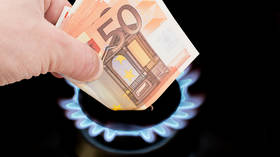EU divided over gas price cap – CNBC

The EU proposal to limit the price of natural gas has left some member states in dismay, CNBC reported on Wednesday. The bloc’s energy ministers are due to debate the issue on Thursday.
Some countries are not happy with the proposed €275 ($283) per megawatt hour ceiling on natural gas prices which aims to prevent sky-high costs for consumers, the media outlet reported. It pointed out that some nations are demanding concrete safeguards before greenlighting the proposal, while others say the cap is too high.
“A price cap at the levels that the commission is proposing is not in fact a price cap,” Greek Energy Minister Kostas Skrekas told CNBC.
“So [a] price cap at €275 is not a price cap, nobody can stand buying gas at this expensive price for a long time. We surely believe that the price cap below €200, between €150 and €200 would be more realistic,” he added.
The report highlighted that Poland, Greece, Belgium and Spain are among the nations supporting the cap. The Netherlands and Germany have been more skeptical about the benefits of the measure, it says.
“It will be a meeting with grumpy people,” an anonymous EU official told the media outlet regarding the upcoming meeting.
The official explained that the commission needs to present further guarantees on how the measure will not distort markets.
European Commissioner for Energy Kadri Simson told reporters on Tuesday that the proposal, known as the Market Correction Mechanism or MCM, is “balanced” and it will help the bloc avoid excessively high prices.
Meanwhile, a group of energy exchanges in Europe, Europex, has reportedly expressed deep concerns about a market correction mechanism, given that it could impact financial stability, as well as security of supply.
Simson insisted that the MCM had taken this into consideration and “the risks are minimal” for supply.
The commission has proposed introducing a cap when prices on the TTF exchange, Europe’s gas benchmark, reach €275 per megawatt hour and when prices are €58 ($59.53) higher than the LNG reference price for ten consecutive trading days within the two weeks. Both conditions need to be met for the cap to be triggered.
For more stories on economy & finance visit RT's business section













